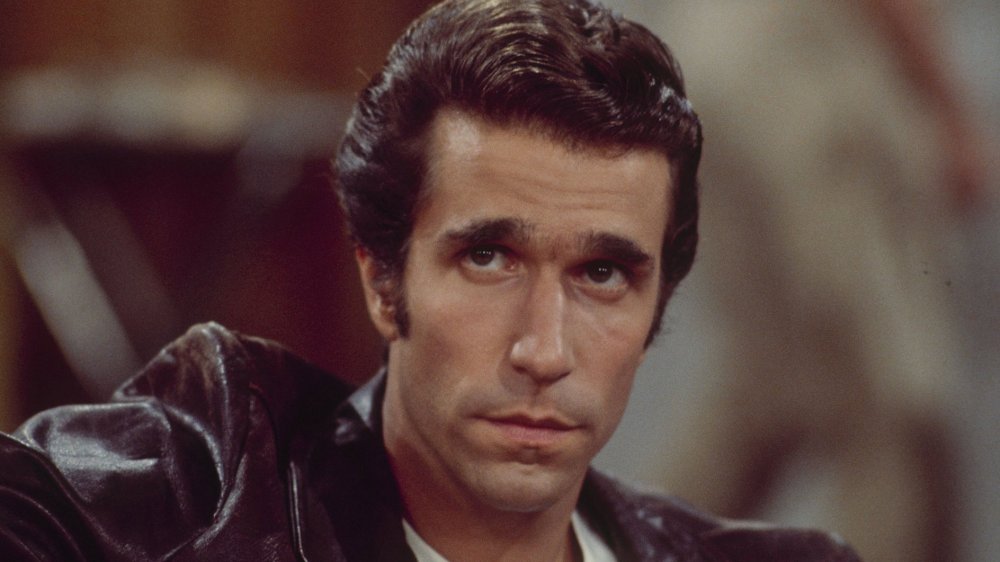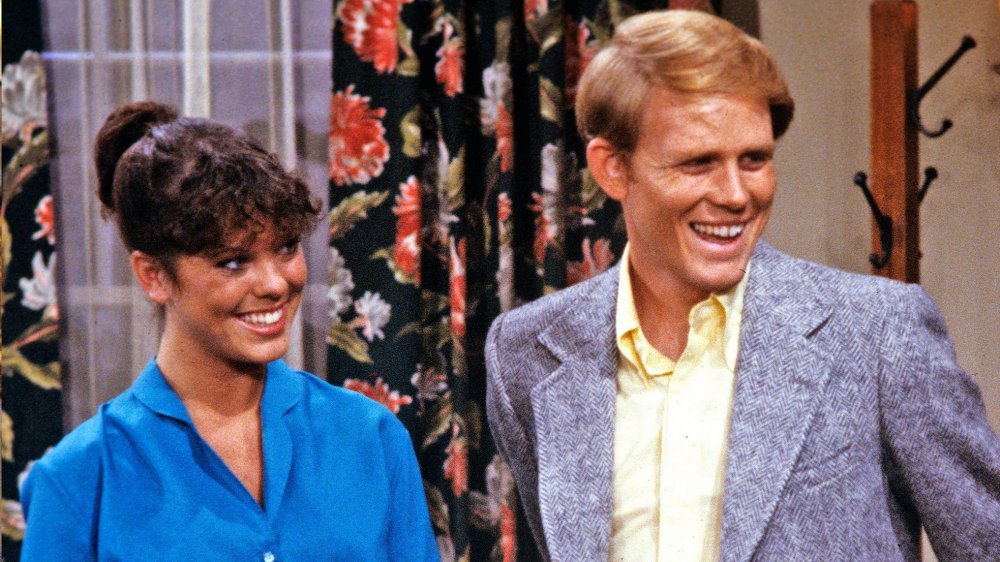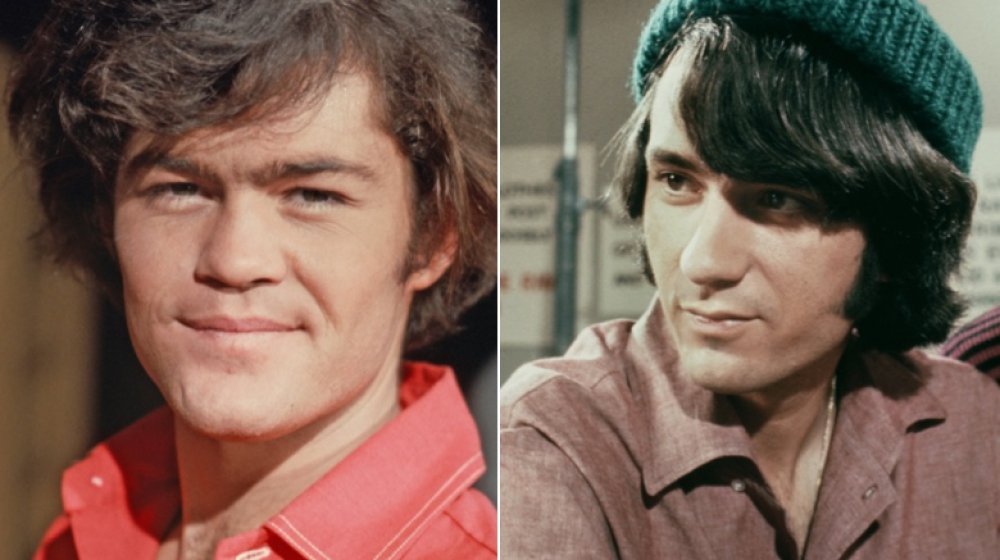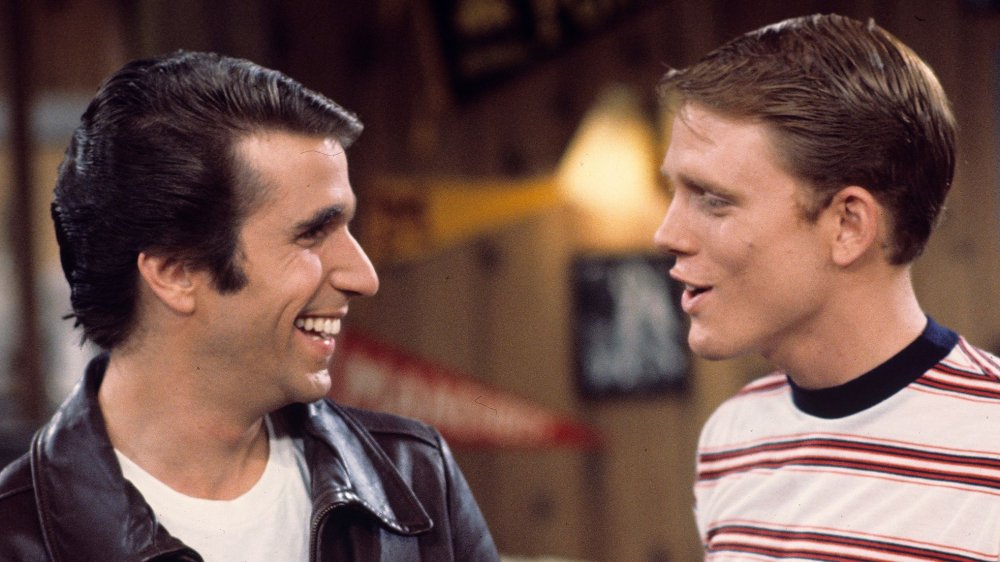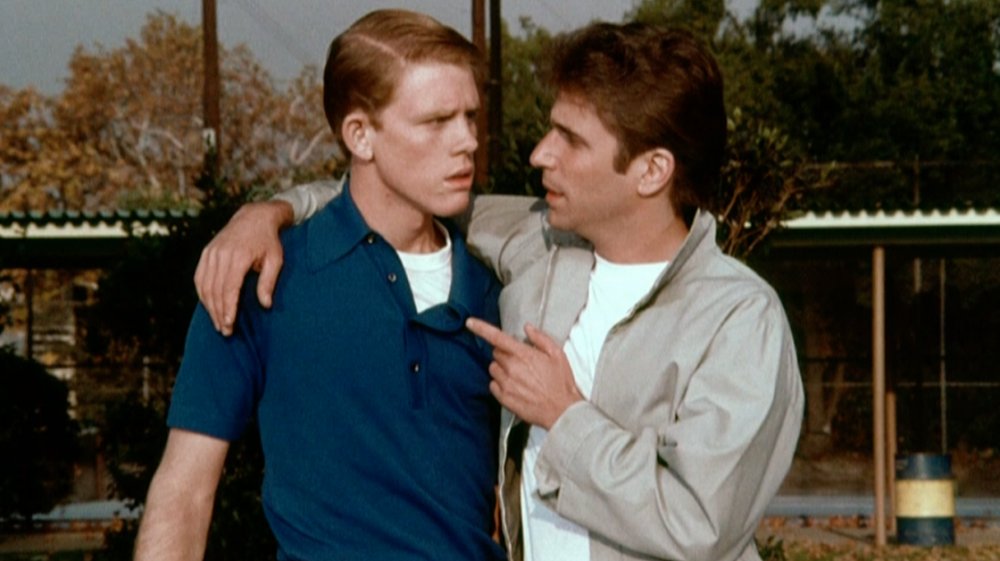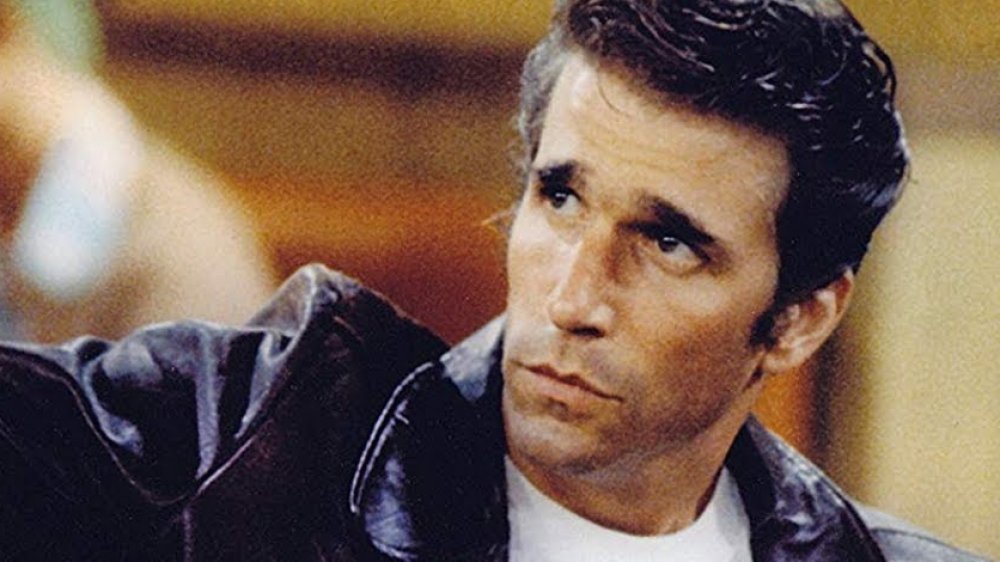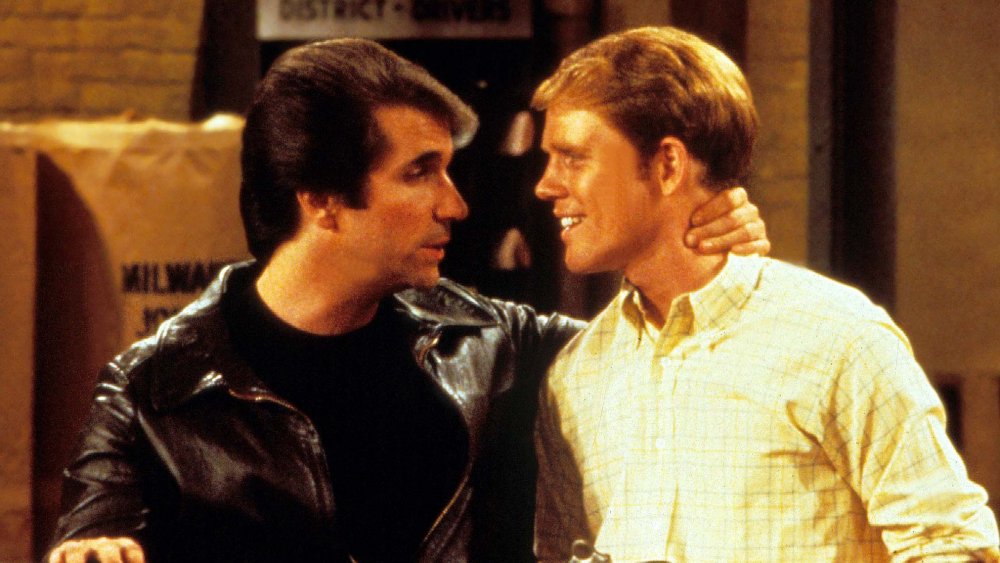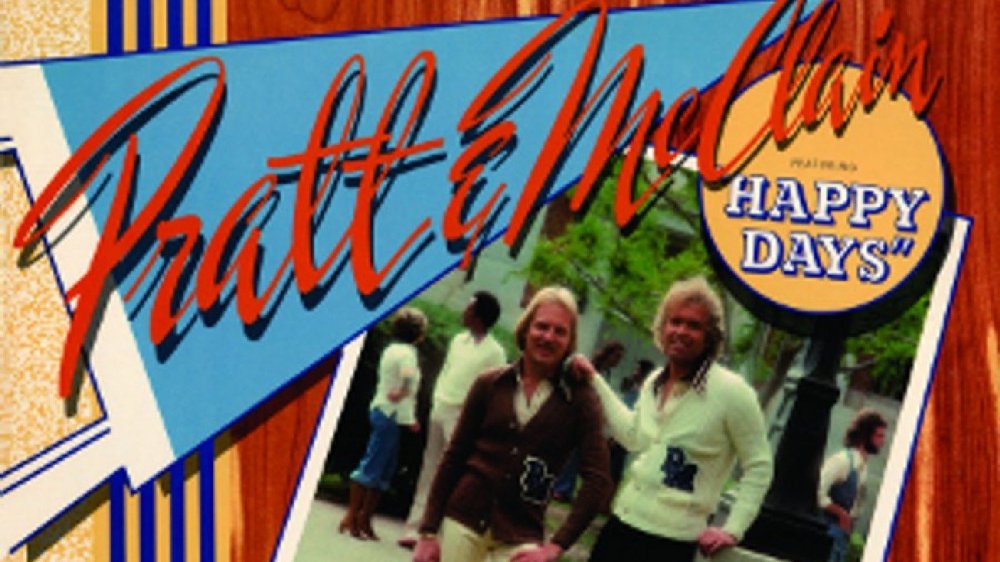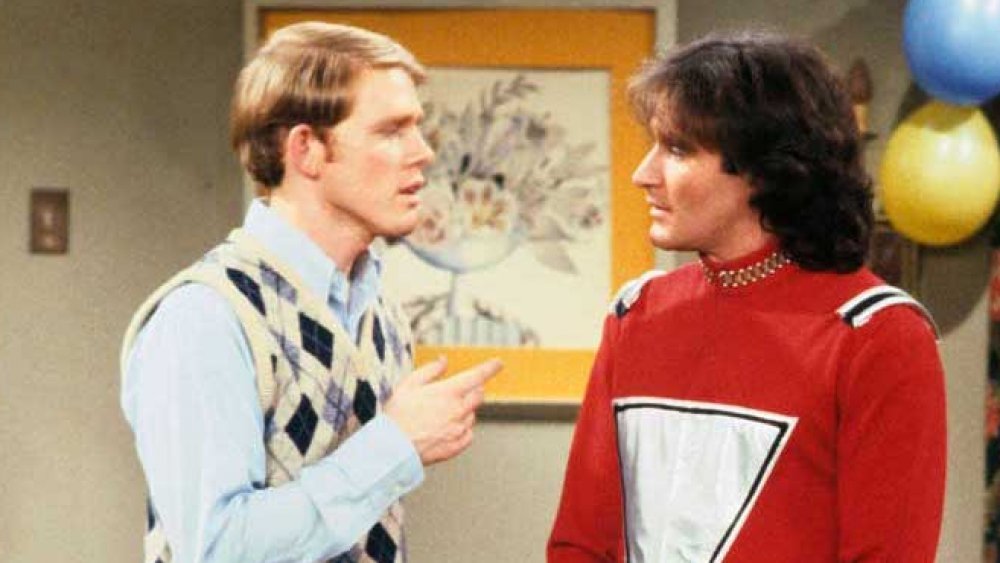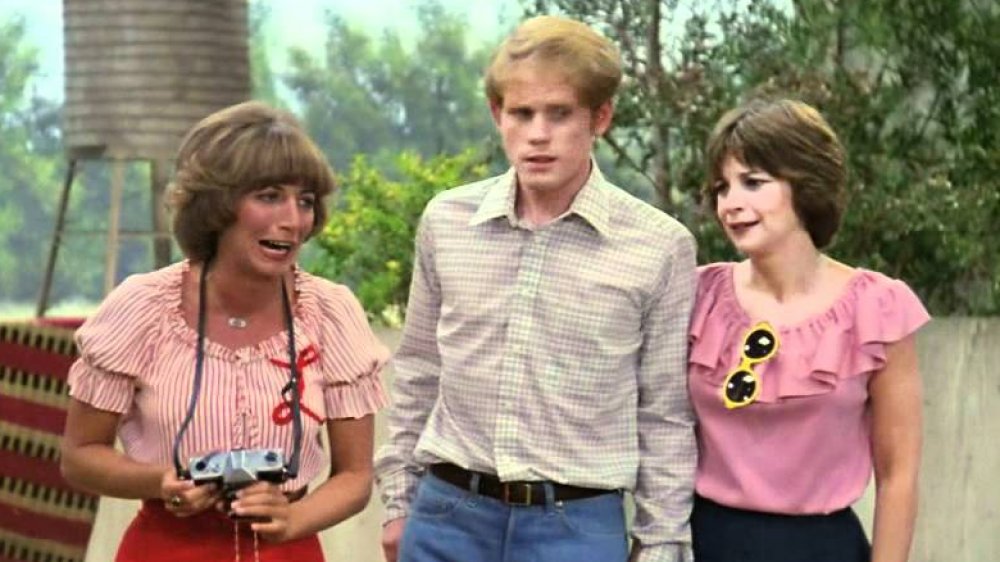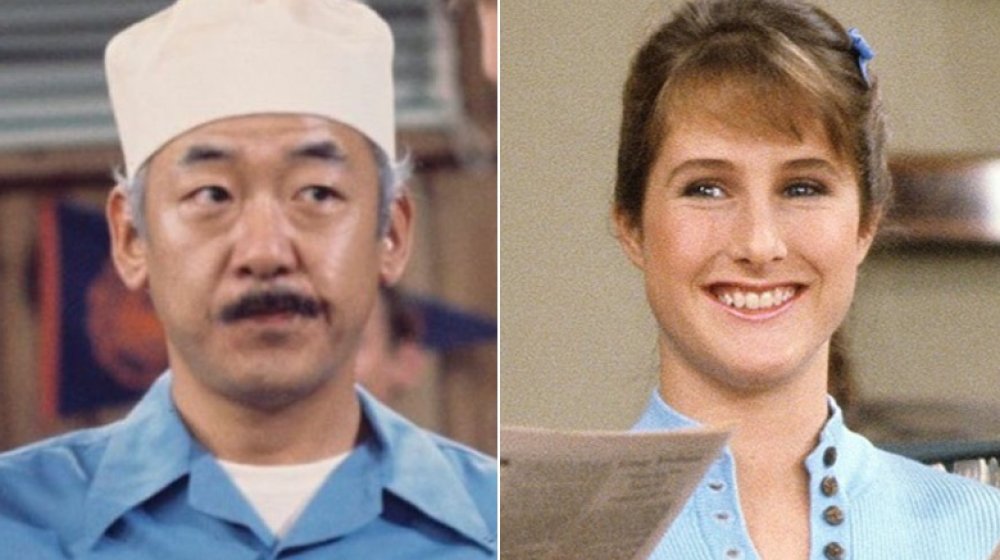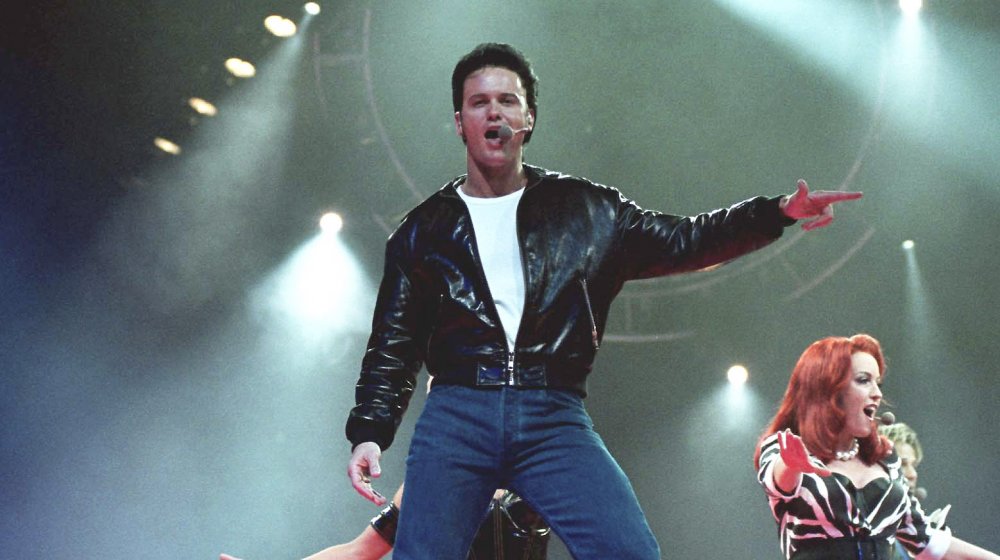The Untold Truth Of Happy Days
Thanks to a wave of nostalgia for the pop culture of the 1950s — early rock n' roll, drive-ins, poodle skirts, and the like, embodied by movies like American Graffiti and Grease — Happy Days became an enormously popular TV sitcom in the 1970s, a feel-good balm for viewers reeling from Watergate, the Vietnam War, social upheaval, and ugly, earth-tone shag carpeting.
Happy Days followed the gentle, warm, and low-key happenings of the Cunninghams, a Wisconsin nuclear family, but especially their teenage son Richie (Ron Howard) and his goofball friends Potsie (Anson Williams), Ralph (Don Most), and, of course, Fonzie (Henry Winkler), the coolest, most confident, and most charismatic character to ever hit the small screen. Happy Days was a major presence on television, lasting for eleven seasons, dominating the ratings, selling heaps of Fonzie merchandise, and fueling the '50s revival that it rode in on, if not being responsible for the collective notion of what the '50s looked and felt like. It's as happy a day as any to "sit on it," grab a burger at Arnold's, and cruise through the history of Happy Days.
Happy Days is not based on a movie
One of the biggest movie hits of 1973, American Graffiti is an ultra-nostalgic movie about teenagers, set in 1962, and starring Ron Howard. Debuting on ABC in January 1974, Happy Days is an ultra-nostalgic television show about teenagers, set in the late '50s, and starring Ron Howard. There's a lot of circumstantial evidence there that would suggest Happy Days is a television version, or flat-out ripoff, of American Graffiti, but Happy Days actually came first, technically speaking.
Producer/director/screenwriter/actor Garry Marshall was approached about the show that would become Happy Days in 1971, talking producers out of their original concept of a nostalgic sitcom set in the 1920s or 1930s. He wrote and shot the first episode — starring future Happy Days stars Ron Howard, Anson Williams, and Marion Ross — well before American Graffiti hit theaters. "When I did the original pilot, no one would buy it. The networks said, 'Who cares about the '50s?'" Marshall told The Guardian. ABC picked up that sole episode and aired it as "Love and the Happy Days" in 1972 on the comedy anthology series Love, American Style, more or less a dumping ground for unsold pilots. Shortly after American Graffiti came out, however, ABC changed course and asked Marshall to develop Happy Days after all.
Happy Days almost starred a Monkee
Casting a television series is a tall order, and long-term success for a show can hinge on whether or not the show's population of actors feels right. Happy Days may have been a completely different show (or may not have worked at all) if not for Ron Howard as Richie Cunningham and Henry Winkler as Fonzie, for example. Plenty of other performers tried out for both those parts. Robby Benson, a 1970s teen idol thanks to appearances in Ice Castles and Ode to Billie Joe, came close to starring as Richie. Don Most also tried out for the part — producers didn't think he was quite right for it, but liked him so much that they cast him as Ralph Malph instead. Winkler got to play the Fonz after beating out two much more famous actors — Michael Nesmith and Micky Dolenz, both members of the Monkees. Roz Kelly joined Happy Days early on as Fonzie's love interest, the tough Pinky Tuscadero. Her main competition for the role: Joyce DeWitt, who would find sitcom success as Janet on Three's Company.
Happy Days rebooted itself
Nowadays, TV shows pretty much have to be a hit right out of the gate — if they don't bring in viewers, networks will cut their losses and cancel a show and replace it with something new. Back in the good old days of the 1970s, networks were more willing to let shows breathe, develop, and build an audience. Happy Days hit ABC's primetime lineup in the middle of the 1973-74 season, and ranked a promising #16 for the year. But in the 1974-75 season, Happy Days was the #48 show in the ratings, running opposite CBS's immensely popular Good Times and tied with the forgotten NBC legal drama Petrocelli.
The show needed to fix something if it wanted to last, and so creator Garry Marshall and producers changed a lot about Happy Days for season three. Gone was the single-camera format, and in came a traditional three-camera setup and live studio audience. The sensitive, relatable coming-of-age stories about Richie Cunningham were toned down in favor of wackier sitcom fare, and a little-used greaser character named Arthur "Fonzie" Fonzarelli enjoyed a much bigger role, showing Richie the ways of the world. One character disappeared completely — little-seen eldest Cunningham brother Chuck (played by Randolph Roberts, then Gavan O'Herlihy) wasn't seen or even mentioned again after season two. The tweaks apparently worked — in its third season, and first under its new format, Happy Days rocketed into the TV ratings top 10.
The birth of a Fonzie
Fonzie is by far the most popular character and element of Happy Days. Born Arthur Fonzarelli, the leather jacket-wearing, jukebox-smacking, finger-snapping tough guy with a kind heart appeared on countless T-shirts and lunchboxes in the '70s and '80s, made "ayyyyy" and "sit on it!" into catchphrases, and shot portrayer Henry Winkler to stardom. This cultural sensation, named by TV Guide as the fourth-greatest television character of all time, did not emerge fully formed. At first, he wasn't even named Fonzie. "I wanted to call my cool character Mash after my Italian name, Masciarelli," creator Garry Marshall wrote in My Happy Days in Hollywood, "but Larry Gelbart already had an army hospital show called M*A*S*H, so that seemed too confusing." Marshall's friend, reporter Bob Brunner, suggested Arthur Fonzarelli, or Fonzie, instead.
Winkler didn't want Fonzie to be like his movie and TV predecessors. "Everyone who's ever played a Fonz-like cool character has always done the same things: combed their hair, stuck cigarette packets up the sleeve of their T-shirt," Winkler told The Guardian. The pilot script required him to approach a mirror and comb his hair. Instead of doing the scene as written, Winkler improvised. "So I walked up, held up my comb, then went: 'Heeeey ... that's perfect, I don't need to comb.' That moment defined the Fonz."
How Fonzie found his leather jacket
Fonzie's signature item of apparel — his leather jacket — didn't arrive immediately. ABC wouldn't let Winkler wear leather, fearing that the jacket was too closely associated with criminals and gang members, and ordered Fonzie to appear in a windbreaker. "It was very hard to be cool in a golf jacket with a very, very flimsy collar that would not stay up," Winkler said in the ABC special The Happy Days of Garry Marshall. Marshall, Happy Days co-creator and a producer, came up with a workaround: Fonzie could wear the leather jacket if he was near his motorcycle — because that's a legitimate safety precaution. Then, to ensure that Fonzie would never be seen in his light blue jacket again, Marshall ordered Happy Days writers to always depict the Fonz with his bike. That led to some silly scenes of Fonzie riding it inside of Arnold's or working on it in his apartment. Once the show got popular, ABC backed off, and Fonzie could wear the leather whenever and wherever, no motorcycle required.
Happy Days almost changed its name
Happy Days, a show from the 1970s about the 1950s, billed itself with a reference to a popular song from the 1930s. First popularized in the 1930 film Chasing Rainbows, "Happy Days Are Here Again" was the official song of Franklin Delano Roosevelt's 1932 presidential campaign, after it got a good response at the Democratic National Convention. It was selected for the title of an Eisenhower-era sitcom after few people liked co-creator Garry Marshall's original, more '50s-appropriate title. "I wanted the show to be called Cool, but test audiences thought it was a brand of cigarette," Marshall told The Guardian, "so my producer said, 'How about Happy Days? That's what we're going to show.'"
However, after it was on the air for a couple of years and well entrenched in the popular culture under the name Happy Days, the show nearly became one of the few shows to change its title in the middle of its run. When the show launched Fonzie-mania in the mid-1970s, executives tried to give the people what they wanted. "They did come to me and said, 'Well the network would kind of like to change the name of the show to Fonzie's Happy Days,'" star Ron Howard told Entertainment Tonight. "And I said, 'Well, I don't think I wanna be in that show.'" Howard seriously thought about quitting the show (and returning to film school) if the title change was made, but it ultimately didn't come to pass.
Happy Days gave the world a lot of music
At the very beginning of Happy Days, producers really wanted audiences to know that this was a show set in the mid-1950s, so the opening theme song for its first two seasons was "Rock Around the Clock" by Bill Haley and His Comets, the first rock song to top the American pop chart back in 1955. Haley actually recorded a new, soundalike version just for Happy Days, although the original version re-entered the Billboard Hot 100 in early 1974, thanks to its inclusion on the American Graffiti soundtrack and this bit of television exposure. Another '50s-inspired song played over the end credits, but when it replaced "Rock Around the Clock" as the opening theme right around the time when Happy Days exploded in popularity, it became a bona fide hit. "Happy Days," composed by "Killing Me Softly" songwriters Charles Fox and Norman Gimbel and performed by duo Pratt and McClain, hit the Top 5. As Richie Cunningham played in a rock band, that naturally led to some real-world musical releases, too. Donny Most (Ralph Malph) released a self-titled album in 1976, while the single "Deeply" by Anson Williams (Potsie) reached #93 on the pop chart a year later. The show's resident teen idol Scott Baio got a record deal, too, of which the highlight was a catchy New Wave ditty called "The Boys Are Out Tonight."
The origins of Mork
While it was primarily a show heavily grounded in realism, Happy Days wasn't afraid to get weird. There's that episode from 1984 when Fonzie falls in love with a ghost, and there's the time an alien dropped in.
In the late '70s, co-creator Garry Marshall couldn't get his son to watch Happy Days. "And I said, 'why don't you like it?' He said, 'well, there is no space people.' He wanted Star Wars. He wanted aliens." Marshall recalled to NPR. And so Marshall decided to add space people to Happy Days, in the form of a silly alien named Mork from the planet Ork who meets Fonzie and then, to frame it in the modest '50s, convinces him it's a dream. "It suddenly wasn't a dream anymore. We decided to make a show based on Mork."
Frenetic comedian Robin Williams was plucked from the Los Angeles nightclub scene to play Mork, both on Happy Days and the hit spinoff Mork and Mindy (which, unlike the original series, was set in the present day), but he wasn't Marshall's first choice. Of-the-moment '70s comedian and impressionist John Byner was offered the gig, and he took it. "Then an odd thing happened: Close to shooting, Byner decided he didn't want to play an alien on a television series," Marshall wrote in My Happy Days in Hollywood. Byner's agency recommended three replacement possibilities: comics Jeff Altman, Richard Lewis... and Williams.
Happy Days launched a lot of spinoffs
Before modern-day TV franchises — CBS's many NCIS shows, or NBC's "One Chicago" — networks would capitalize on a hit show with spinoffs. Happy Days was so popular that ABC entrusted its writers and producers to churn out spinoffs with a machine-like consistency. First came Laverne and Shirley in 1976, starring Penny Marshall and Cindy Williams as best friends and brewery workers, introduced on Happy Days as dates for Fonzie and Richie. By 1978, Laverne and Shirley would edge out its parent show as TV's most popular series. That same year, Mork, an alien portrayed by Robin Williams, visited Happy Days as a prelude to the birth of Mork and Mindy, which in its first season would tie Happy Days as the #3 show in the ratings. Joanie Loves Chachi followed in 1982, which found Joanie Cunningham (Erin Moran) and Fonzie's cousin Chachi (Scott Baio) moving to Chicago to pursue their romance and careers in music.
And those are just the successful ones. Nancy Walker played Nancy Blansky, Howard Cunningham's cousin from Las Vegas, on a 1977 Happy Days episode, then moved on to 13 episodes of Blanksy's Beauties, in which the character operated a boarding house for showgirls. Out of the Blue concerned Random (Jimmy Brogan), an angel-in-training who made a stop on Happy Days in addition to a short-lived standalone series in 1979. Two other spinoffs, The Ralph and Potsie Show and one featuring Pinky Tuscadero, never made it past the pilot stage.
Happy Days changed up its cast a lot
Over its 11-season run, Happy Days experienced a lot of characters coming and going. Arnold, operator of teen hangout Arnold's, left after three seasons because actor Pat Morita landed a role on the sitcom Mr. T and Tina, and Al Molinaro came on as new Arnold's proprietor Al Delvecchio. Scott Baio joined the cast in season five as Charles "Chachi" Arcola — Fonzie's cousin, Richie's drummer, and Joanie's boyfriend. Lynda Goodfriend came on in season five in the recurring role of Lori Beth Allen, Richie's girlfriend; she'd become a regular character after she and Richie got married, although by that point, oddly enough, Richie was off the show. He joined the military because actor Ron Howard left Happy Days in 1980 to pursue his career as a film director. His ostensible replacement on the show: Ted McGinley as Roger Phillips, a Cunningham nephew, high school gym coach, and Fonzie foil. That's also when Cathy Silvers began appearing as Jenny Piccolo, Joanie's often mentioned but never seen best friend. As the show wound down, Crystal Bernard and Billy Warlock earned screen time as Howard's niece K.C. and Roger's brother Flip, respectively, making up for the absence of Erin Moran (Joanie) and Baio, who departed for Joanie Loves Chachi.
The Happy Days go on and on
Once the number one show on television, and often a top-five hit, Happy Days faded from popularity in the early 1980s and finished out its 11-season run in 1984 with the wedding of Joanie Cunningham and Chachi Arcola. But the show never completely went away — it's endured in reruns on cable and on local stations for decades, and even jumped to a different format. In 1999, a Happy Days stage musical made its debut in London. Henry Winkler opted to not play Fonzie to a live audience, but served as a creative consultant on the show, whose songs included the Happy Days theme and vintage '50s hits like "Rock Around the Clock." Then in 2007, another, completely different Happy Days extravaganza made its debut in the United States. A collaboration between Happy Days creator Garry Marshall and Oscar-winning songwriter and actor Paul Williams, Happy Days — The Musical booked a successful nationwide tour in 2008.
And there's even a chance that fans nostalgic for the nostalgic Happy Days could see the show return to television. In 2019, Cathy Silvers, who portrayed Joanie Cunningham's best friend Jenny Piccolo in the latter years of Happy Days, started shopping a new Happy Days to TV producers. In her concept, which she calls Happy Days Again, Jenny Piccolo would take over Arnold's Drive-In and turn it into a healthy restaurant, all while raising five kids.
